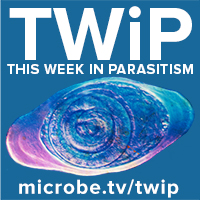TWiP solves the case of the case of the boy in Uganda with a mobile piece of spaghetti in the gallbladder, and reviews papers on female genital schistosomiasis in rural Madagascar, and a volatile sex attractant of tsetse flies. Image of Ascaris courtesy of Ryan Relich.
Hosts: Vincent Racaniello, Dickson Despommier, Daniel Griffin, and Christina Naula
Click arrow to play Download TWiP #215 (49 MB .mp3, 81 minutes)
Subscribe (free): Apple Podcasts, Google Podcasts, RSS, email
Links for this episode
- Female genital schistosomiasis in Madagascar (PLoS NTD_
- Volatile sex attractant of tsetse flies (Science)
Become a patron of TWiP
Case Study for TWiP 215
This case is of a 24 year old male who presented to the emergency room at the end of February with a 4 day history of fever, starting three weeks after he returned from a long trip. He reports traveling in India during October of the past year. From November to early January, he stayed in Papua New Guinea, from where he traveled to Thailand, returning to Israel in early February.
On admission he reports a daily fever up to 40 degrees C, which I think is 104 Fahrenheit. He also mentions an itchy rash and dry cough.
We learn a bit more about this patient.
In Thailand, he received a five-day course of doxycycline due to a febrile illness, which resolved after treatment. During his stay in Papua New Guinea he hiked in the jungle, was bitten by multiple insects and also report finding leeches attached to his lower legs. One insect bite on his hip took a while to heal. He also reports swimming in multiple rivers. While travelling, he did not have unprotected sexual encounters but he admits to eating street food and home made food regularly. He received pre-travel vaccines and when he was in Papua New Guinea took Atovaquone Proguanil prophylaxis daily, discontinuing therapy a week after he flew to Thailand.
On physical exam he is alert and oriented, vitals normal, the examination is unremarkable except for three cropped vesicles on his penis, which the patients says are itchy. A healed insect bite on his lower hip is also noted. His white blood count and differential are normal without eosinophilia. His haemoglobin is 13 g/dl, which is borderline normal and his platelet count is lower than normal with a count of 100,000 per microlitre of blood.
What is your diagnosis? What test or tests would you like to order to confirm your suspicion.
We would like you to be as accurate as you can when identifying the parasite causing this man’s symptoms.
What are special considerations you need to think about for treatment?
Send your case diagnosis, questions and comments to twip@microbe.tv
Music by Ronald Jenkees

